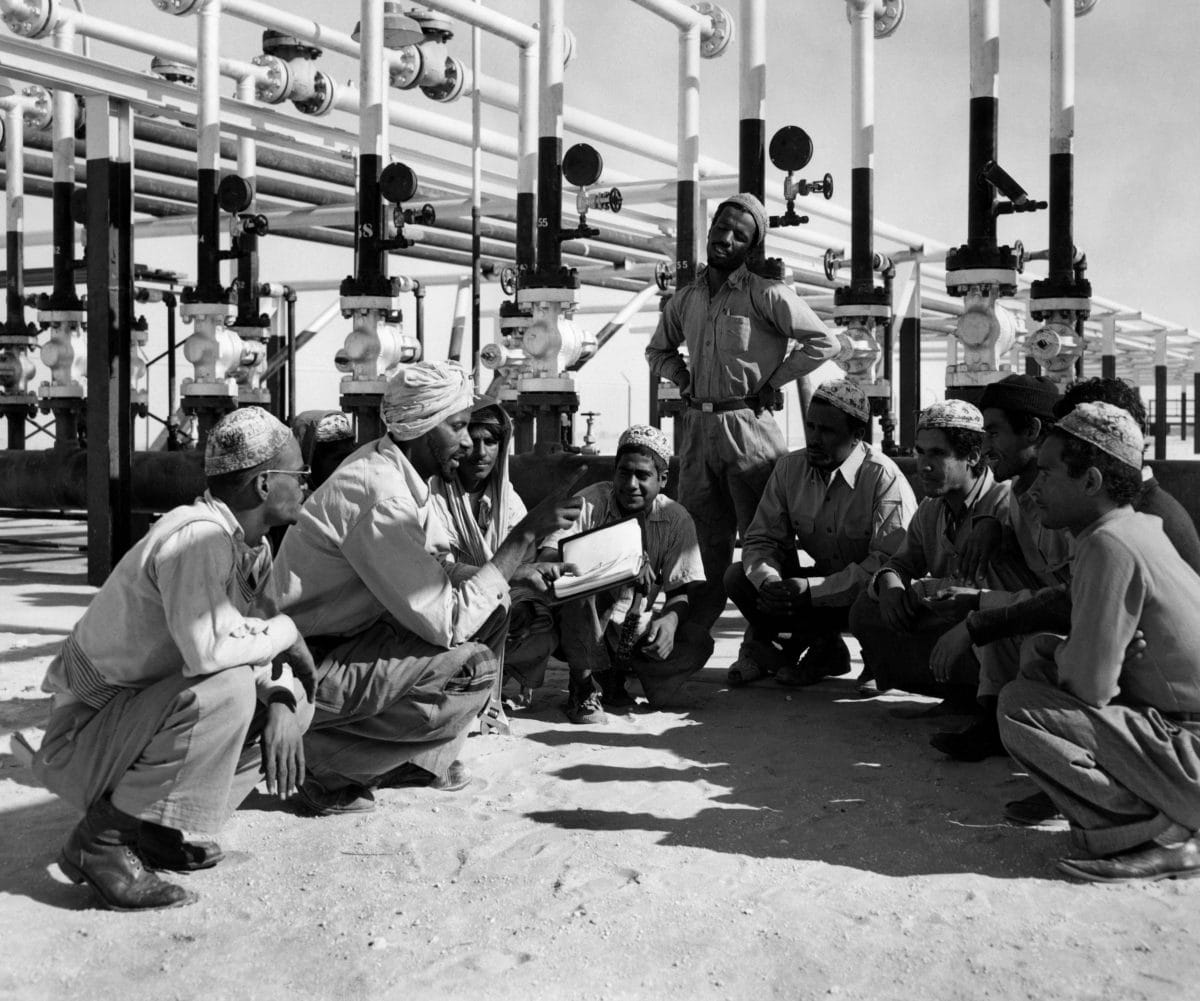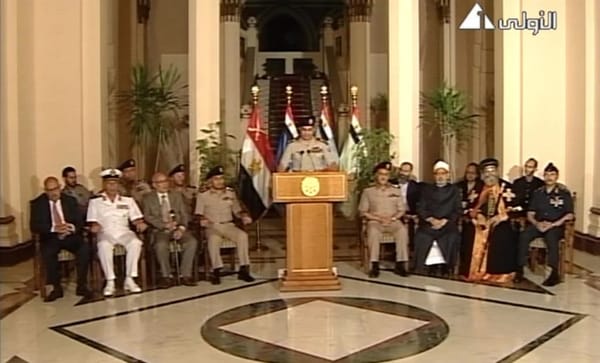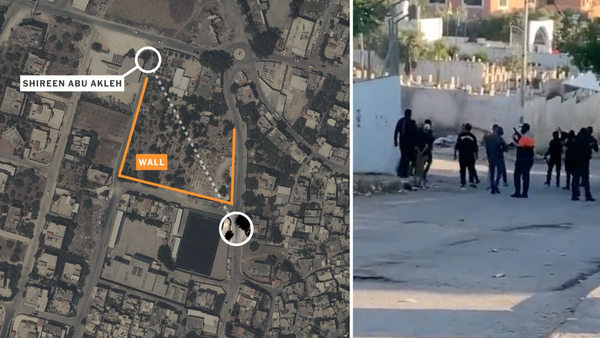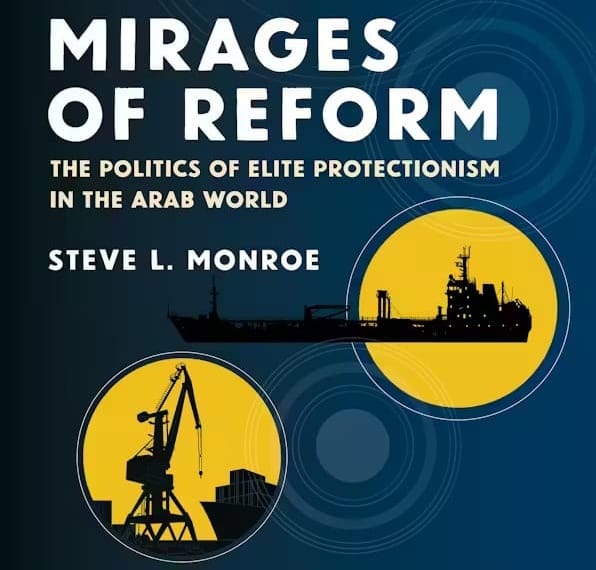Unruly Labor in the Gulf and the MENA Academy

The fall semester is now well underway, which has been exhilerating in some ways and exhausting in others. There's a lot going on in the Trump administration's ongoing war on higher education and a lot going on in the Middle East. For now, though, I want to catch up with the MENA Academy. First, I want to draw your attention to approaching deadlines for two great POMEPS opportunities: the junior scholar book workshop, for intensive workshops on first books on the Middle East (applications due September 15); and the spring virtual research workshop, for article manuscripts on the Middle East (due October 15). We've been running these workshops for over a decade, and they have consistently been highly productive and resulted in a very high yield of published books and articles. Apply now!
Next, some personal notes. America's Middle East publishes in the UK with Hurst in a month (October 9), and will be published in the US by Oxford in early December. Since nobody except my editor read the manuscript before it went to print, I was blown away a few weeks ago to read half a dozen blurbs from a wide range of people I admire: Rob Malley calls it a "remarkable, aching book"; Fida Jiryis calls it an "excellent, unflinchingly honest account of what every Arab knows"; David Kirkpatrick calls it a "tragic story, written with passion, precision, honesty and courage. Essential reading on how American myopia, bias and hypocrisy set the stage for Gaza." With publication imminent, I am thrilled to now announce the first stops on my book tour: Kings College London (in London) on October 9 (publication day); Perry World House (Penn) on October 21; and November 5 at GW's Elliott School (DC). There will be a lot more in the spring, which I'll post as we get closer. Hope to see you there if you live in any of those areas!
I will not be attending the APSA Annual Conference in Vancouver this year, so if you have a book proposal or other business you hoped to discuss with me just drop me an email and we can find a time to Zoom. I will be at the MESA Annual Conference in Washington DC, though I fear that this will be a difficult destination for most scholars based outside the country (and potentially daunting even to those who live in the US if it remains under occupation by armed, masked federal agents and red state national guard units). If you can make it, please do put the POMEPS reception Monday evening on your calendar. I will be on two panels, one on Monday morning celebrating the work of Gregory Gause, and the other on Tuesday morning discussing the new book From Apartheid to Democracy by Sarah Leah Whitson and Michael Omer-Man.
And now for the good stuff.
Book of (Last) Week: Andrea Wright, Unruly Labor: A History of Labor in the Middle East (Stanford University Press, 2024). I had hoped to review Wright's fantastic recent book on Labor Day, but the start of the semester craziness got in the way. I'm happy to do so now, though. Wright focuses on the labor activism of mostly South Asian migrant workers in the Gulf from the 1930s through the late 1960s. In line with other recent scholarship, she recovers a history of political organization and mobilization by workers in the evolving oil industry of the Gulf which might surprise those unfamiliar with that long forgotten history. And she details the increasingly repressive measures developed by the British, oil companies, and nascent states to suppress it – measures which often adapted all to seamlessly to the repression of citizens and other forms of independent political activity in the Gulf countries.
As in her previous book Between Dreams and Ghosts (listen to our podcast conversation about it here), Wright situates Middle Eastern oil production within a broader Indian Ocean world of fading British imperial control and distinctively organized labor migration. She shows how labor strikes early in the oil era back to the 1930s proved remarkably effective in forming cross-national worker coalitions demanding better working conditions and better food. And then, inevitably, she documents how oil companies, local rulers, and British imperial agents challenged by those strikes moved to suppress and weaken them. Wright shows how citizenship regimes came to matter in those suppression efforts, with differential treatment offered to laborers based on their citizenship status. Workers would be increasingly grouped together by nationality to prevent cross-national mobilization, while "problematic" (i.e. politicized) nationalities would be removed and replaced with workers considered more likely to keep quiet. She shows how these labor classifications contributed to broader discourses and practices of citizenship, rights, and race which would endure in the post-independence Gulf.
Wright's careful reconstruction of the suppression of labor activism in the oil industry ranges from Iran through the emergent states of the Arabian peninsula to the British protectorate of Aden, capturing both broad transregional trends and local particularities. Fear of Communist recruitment and organization loomed large in places like Iran (and not only Iran) during those Cold War years. In many of the emerging Arab countries, questions of citizenship loomed large. Indians, long valued for their skills and experience, became problematic after Indian independence with their nationalist identity and the new independent government which could advocate for their rights. Iranians and Iraqis were problematic because they might bring their leftist ideas and labor protest experience with them. Locals or non-local Arabs might be unduly inspired by pan-Arabism. In Kuwait and other Arab countries, it wasn't always even clear which workers had local citizenship. In Bahrain and Saudi Arabia (as seen in Robert Vitalis's pathbreaking book America's Kingdom), rigid racial hierarchies ensured that only white Europeans and Americans were put into positions of authority regardless of the skills and experience of Middle Eastern or South Asian workers.
Unruly Labor is a rich and important contribution to several critically important and rapidly developing literatures. It builds on critical studies of oil such as Timothy Mitchell's pioneering Carbon Democracy, and sits nicely alongside Adam Hanieh's new book Crude Capitalism (which I plan to review soon). It builds on a lot of recent work focused on de-exceptionalizing the Gulf, situating it within broader histories of colonialism and decolonization and the evolution of global capitalism. It similarly builds on recent work focused on recapturing histories of the Arab Left and long traditions of labor and political activism in a region where such histories were long suppressed or conveniently forgotten. It would have been the perfect Labor Day reading, but alas. Definitely check it out!
MENA Academy Article Roundup
We've got several weeks worth of fascinating academic research on the Middle East to catch up on, so here we go. First up, we feature a genuinely novel piece by Sami Hermez, which began its life in a workshop I hosted about Middle Eastern warscapes and has now evolved into an important intervention on conceptualizing the Levant as a single warscape. Next, we feature two articles by friends of POMEPS on security policy: Emma Soubrier on defense industrial policy in the UAE and Saudi Arabia, and Maria Louise-Clausen on the role of impunity in the politics of security force assistance in Iraq. We then turn to three articles on various dimensions of colonization, decoloniality, and politics in Palestine: Hannah Bagdonov in the APSR on claim-making in East Jerusalem, Areej Sabbagh-Khoury on the micro-dynamics of land acquisition in mandatory Palestine, and Jamal Nabulsi on emotion and decolonial practice in Palestinian hip hop.
We then feature two articles from the Chinese academy: Xin Su and Pengyu Zhao review the evolution of Chinese Middle East Studies since 1978, and Hao Wu explores China's maritime peacekeeping operations in the Gulf of Aden. Finally, we highlight three interesting political science case studies: Habiba Ashraf Sherif on how Yemen's Ansarallah (Houthis) consolidated and maintain power, Camille Abescott on the increasing challenges to service-oriented Jordanian MPs, and Alfonso Casani, Francisco Colin, and Irene Fernandez-Molina on how Israel's various wars on Gaza have affected space for political opposition in Morocco. Enjoy!
Sami Hermez, "The Levantine Warscape: Methodological Nationalism and the Politics of Normalization with the Israeli State," Middle East Critique (August 2025). ABSTRACT: This article begins by identifying the Levant region in terms of a single warscape to argue that we should move beyond methodological nationalism when approaching and studying the region. It argues that if methodological nationalism remains unchallenged, the normalization of Israel by scholars becomes inevitable. Thus, after offering a critique of methodological nationalism, the article elaborates on the politics of normalization with Israel, which is one major aspect of war, and discusses how to combat normalization in denationalized terms. Seeing the Levant beyond methodological nationalism is not meant as a purely academic exercise. It has political implications for the struggle against normalization, and, importantly, opens a way to imagine futures with different and non-national empirical realities, where the present-day Lebanese, Israeli, Jordanian, and Syrian states (at least) are dismantled, and so are the politics of identity inherent to them.
Maria-Louise Clausen, "Vicarious Impunity: Othering in Security Force Assistance in Iraq," Middle East Critique (September 2025). ABSTRACT: This article introduces the concept of ‘vicarious impunity’ to describe how Western interveners, particularly through Security Force Assistance (SFA), distance themselves from the consequences of violence. By leveraging local partners, Western actors not only reduce their physical involvement but also shift responsibility for violence onto those partners. The term ‘vicarious impunity’ encapsulates this dual dynamic: while Western interveners claim to support peace and stability, they simultaneously absolve themselves of accountability for the violent outcomes of their interventions. Using the case of the NATO Mission Iraq (NMI), this article examines how othering practices facilitate this phenomenon, enabling Western actors to maintain moral authority while distancing themselves from the realities of violence in Iraq. Drawing on fieldwork and interviews conducted in Iraq, the article examines how path dependencies from earlier interventions, particularly the 2003 US-led invasion, continue to shape the operational and moral framework of NMI. This analysis contributes to the SFA literature by linking these practices to broader postcolonial dynamics and demonstrating how Western powers seek to sustain their strategic influence through indirect means. The concept of vicarious impunity thus offers a new lens to understand the complex intersections between security assistance, intervention, and accountability.
Emma Soubrier, "The Gulf defence industry, at the cutting (h)edge of multi-level power strategies," Defense and Security Analysis (September 2025). ABSTRACT: This article examines the defence industrialisation strategies of Saudi Arabia and the United Arab Emirates, traditionally amongst the world's largest arms importers, through a multi-scalar lens. It argues that their pursuit of local defence capabilities forms part of a broader power strategy – bolstering regime resilience, asserting regional autonomy, and repositioning globally in a multipolar world. The analysis explores how these ambitions are framed, what is at stake economically and politically, and what is achieved. By unpacking national, regional, and global dimensions, the paper highlights how defence industrialisation in the Gulf is both instrumental and symbolic. It identifies progress and persistent constraints, including skills gaps, foreign dependency, and shifting global dynamics. A comparative discussion of Israel and Turkey sharpens the examination of feasibility and divergence. The paper offers a grounded, critical understanding of how Gulf defence industries reflect and shape evolving power strategies, especially those related to autonomy and international status.
Hannah Bagdonov, "State Legitimacy and Sector-Level Claim-Making: Evidence from East Jerusalem," American Political Science Review (August 2025). ABSTRACT: In East Jerusalem, the vast majority of Palestinians contest the legitimacy of the Israeli state’s claim to sovereignty. This necessarily affects how Palestinians engage with the state in pursuit of goods and services. But how? Using data from 55 interviews and original observational and experimental survey data from a representative sample of East Jerusalemites, I show that civilians’ engagement with each good, service, and institution of the state is a function of their perceptions of the state’s legitimacy, or right to rule, in that sector. Civilians will avoid engagement with goods, services, and institutions that explicitly affirm the state’s claims to monopolized sovereign rule, without forsaking essential goods and services. This article empirically illustrates that the same individual will make different choices with respect to each state sector, and in doing so builds on the burgeoning recognition of sector-level choices in the citizen claim-making literature.
Areej Sabbagh-Khoury, "Colonialism by Purchase: Coercion and Replacement in Rural Palestine," Politics and Society (September 2025). ABSTRACT: This article conducts a microhistorical sociological analysis of land grab in the Jezreel Valley/Marj Ibn 'Amer of northern Palestine during the British Mandate, examining purchase and coercion that functioned as mechanisms of settler colonization. Drawing on original archival research in local colony and national movement archives, it reconstructs how socialist Zionist settlers from the Hashomer Hatzair movement, in coordination with land-purchasing institutions and the British imperial government, displaced indigenous peasants who held long-standing usufruct rights. Assessing the dialectical processes between settlers and the indigenous population, the article traces how the protracted colonization of fertile lands and villages unfolded in rural Palestine, culminating in the gradual transfer of territorial sovereignty to the Zionist movement. Challenging dominant Zionist narratives centered on the 1948 war, it foregrounds an extended settler colonial process, showing how village destruction and land seizure took place both before, during, and after the Nakba. It highlights how indigenous removal and elimination are central to the settler colonial logic, operated through violent, legal, and administrative means, while also attending to indigenous local resistance as a key feature of the evolving settler colonial landscape.
Jamal Nabulsi, "Affective sovereignty: A decolonising politics of emotion in Palestine," Review of International Studies (August 2025). ABSTRACT: Despite ongoing attempts to fragment and eliminate the Palestinian people, Palestinians persist on their lands and continue to uphold their right to return home. In this article, I suggest that vital to this persistence are Palestinian feelings of belonging to and longing for Palestine. Together, these constellations of feeling form what I call affective sovereignty. Through this concept, I argue that such feelings constitute a sovereign Indigenous Palestinian claim to the land. That is, a Palestinian Indigenous sovereignty is sustained, affirmed, and reproduced in part through feeling. I track forms of affective sovereignty through the practices of Palestinian graffiti and hip-hop music. I find in these aesthetic practices four interrelated themes that together express an affective sovereignty. First, I analyse expressions of belonging to the land of Palestine. Next, I turn to expressions of belonging to the Palestinian people, particularly those that express unity across the geographic fragments of Palestine. Third, I analyse expressions of longing for Palestine from the condition of exile. Finally, I explore how these feelings are drawn into more directly resistant expressions of Palestinian sovereignty, suggesting that affective sovereignty forms the molten core of Palestinian resistance.
Xin Su and Pengyu Zhao, "The Modernization Turn in Chinese Middle East Studies since the Reform and Opening Up of 1978," Middle East Critique (September 2025). ABSTRACT: This article argues that Chinese scholarship on the Middle East has experienced a pronounced modernization turn since the 1978 Reform and Opening Up. Drawing on the re-establishment of Area Studies institutions and the maturation of China’s own modernization theories in the 1980s, early work produced pioneering analyses of developmental trajectories in latecomer societies. From the 1990s to the early 2000s, the professionalization and institutional standardization of Middle East studies in China fueled rapid growth in the field, with research increasingly focused on pathways to modernity, revolutionary transformations, and nation-state construction in the region. In the wake of the Arab uprisings, Chinese scholars have integrated the paradigm of modernization with emergent political and economic crises to offer novel insights into how livelihood and developmental concerns can mitigate regional conflicts. Despite significant advances in theoretical frameworks and methodological rigor, Chinese studies on modernization in the Middle East still have opportunities for further progress in disciplinary consolidation, agenda-setting, fieldwork depth, and the production of high-impact scholarly outputs.
Hao Wu, "Understanding China’s engagements in African conflict resolution: the counter-piracy campaign in the Gulf of Aden," European Journal of International Relations (August 2025). ABSTRACT: Why has China exhibited seemingly inconsistent or even contradictory positions in its contributions to conflict resolution in different African conflicts? There is considerable literature exploring the determinants of China’s policy, but thus far there is no analytical framework for analyzing how the policy-making process works and the role of Chinese elites within this process. This article applies data from within-case process tracing and elite interviews with Chinese foreign-policy makers to a detailed case study of China’s engagements in the counter-piracy campaign in the Gulf of Aden. The principal finding is that China’s level of participation is determined jointly by three independent variables: the level of endogenous threats to China’s economic interests, the international expectations about China’s engagement, and the host country’s receptiveness to external intervention. These are translated through the Chinese elites’ perceptions into the policy outcome. By incorporating these factors into an analysis of China’s decision-making, this article contributes to a better understanding of China’s foreign policy decision-making process in the African context.
Habiba Ashraf Sherif, "Strategic Resistance and Ideological Dominance: The Rise and Institutionalization of Ansarallah’s Power in Yemen," Middle East Critique (August 2025). ABSTRACT: In the mid-2010s, the Ansarallah movement progressively asserted itself as the dominant political and military force in northern Yemen. This article investigates how Ansarallah institutionalized its power by strategically framing its resistance against perceived systems of global and regional oppression, particularly those tied to US-led imperialism and their allied states. While the group’s recent attacks on Red Sea shipping in response to the war in Gaza have attracted international attention, these actions also serve to reaffirm its ideological positioning within the so-called ‘Axis of Resistance’. Drawing on fieldwork, interviews, and discourse analysis, this article traces Ansarallah’s emergence through three interrelated processes: the construction of symbolic and material boundaries through the identification of successive adversaries; the politicization of everyday life via religious, cultural, and symbolic practices; and the restructuring of formal and informal governance mechanisms in the areas under its control. Mobilizing Foucault’s concept of the dispositif, the article examines how Ansarallah has forged a ‘regime of truth’ that legitimizes its vision for a new Yemeni society. Central to this transformation are the ideological writings of Hussein al-Houthi, particularly his malazim, and the institutionalization of practices such as youth indoctrination, commemorative rituals, and educational reform. The article also highlights how regional actors, notably Saudi Arabia and the UAE, have contested Ansarallah’s legitimacy by deploying counter-discourses aimed at framing the movement as a foreign proxy. Ultimately, this article contributes to broader debates on the relationship between resistance, legitimacy, and state-building in contexts of prolonged conflict and geopolitical contestation.
Camille Abescott, "The Erosion of a Role? Jordanian MPs and the Weakening of a Political Clientelism System," Middle East Law and Governance (August 2025). ABSTRACT: In Jordan, Members of Parliament (mp s) have historically acted as intermediaries between the Hashemite monarchy and the population. Since the creation of the parliamentary institution, they have redistributed resources, such as public jobs, to their constituencies, in a more general context where public employment has enabled the crown to secure the political loyalty of Jordanian tribes. The stabilizing role of public employment was nevertheless called into question with the introduction of neoliberal reforms since the 1980s onwards. This article examines the effects of this evolution on the daily lives of mp s. Based on data collected during several fieldworks between 2019 and 2022, it examines their different strategies to continue, with difficulty, to perform their “service” role with their constituents. The article also explores mp s’ willingness to invest more time in other functions, such as parliamentary oversight, in order to win and retain loyalty among their voters.
Alfonso Casani, Francisco Colin, and Irene Fernandez-Molina, "Foreign Policy and Domestic Opposition Spaces under Authoritarianism: Moroccan Political Reconfigurations in Response to Israel’s Wars on Gaza," Government and Opposition (September 2025). ABSTRACT: Moments of heightened violence and war in Palestine have often elicited extraordinary regime and opposition reactions in Arab states, including large-scale popular protests that are otherwise rare in such authoritarian contexts. This article examines how foreign policy influences domestic political opposition under authoritarianism. We approach this relationship combining classical insights from foreign policy analysis (FPA) with our own theorization of opposition as a tri-dimensional political space – as the dynamic product of intersecting institutional, practical and discursive spaces. Empirically, we capture such complexity through an exploratory, in-depth case study focusing on Morocco and, specifically, on the expressions and reconfigurations of its opposition movements in response to Israel’s wars on Gaza (2008–2009 and 2023–2025). Drawing on interviews conducted between 2007 and 2024 as well as official statements and press releases, these two episodes shed light on the consequences of both time-bound foreign policy shocks and more gradual, structural foreign policy transformations.
If you find Abu Aardvark's MENA Academy useful, and you can afford it, please consider a paid subscription. Ghost is refreshingly free of Nazis compared to Substack and doesn't promote objectionable content, but it's quite expensive on my end. Thank you!



